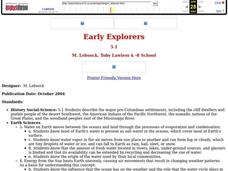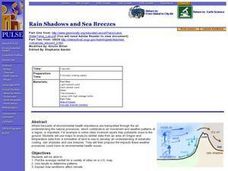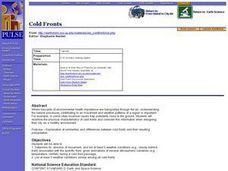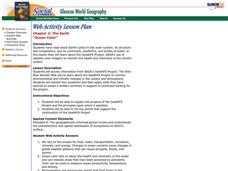Curated OER
Why Here? Why Not There?
Middle schoolers analyze a map and graph information on eleven countries. Using the characteristics of the countries, they determine if they should host the summer or winter Olympic games. After viewing a video, they locate the...
Curated OER
Fraser River Watershed Weather
In this weather worksheet, students access a website to complete a graphic organizer comparing the temperature, pressure, and humidity of 10 locations in British Columbia.
Habitat Conservation Trust Foundation
Greenhouse Gas Game
You will need to gather a number of tokens, bags, and other various game components in order to incorporate this activity into your curriculum. Different tokens represent carbon dioxide, methane, and nitrous oxide. Printable 8.5"x11"...
Curated OER
Watch the Sky: Observing Clouds and Patterns
Students observe clouds outside of the classroom. In this weather lesson, students investigate and record the clouds above their classroom everyday for three weeks. The students then analyze their data and discuss what causes specific...
Curated OER
Hurricanes
Eighth graders gather information on hurricanes that are affecting the world at the time of the lesson. They work together in groups to collect the data and record their information in a table. They are asked questions to finish the lesson.
Curated OER
Early Explorers
Fifth graders study early explorers. In this World history lesson, 5th graders draw an outline of a map labeling each part, build geographical features out of dough, and paint each of the land and water features.
Curated OER
Art And Ecology: Check Out This Place!
For this art and ecology worksheet, students look at paintings and answer questions, using the painting, a world map and climate. There are 2 pictures, each with its own set of questions.
Curated OER
Rain Shadows and Sea Breezes
Students plot the average rainfall for a variety of cities in the United States. Using the map, they work together to determine patterns on which toxicants are transported through the air. They determine the impacts of various weather...
Curated OER
Cold Fronts
Learners determine its' direction of movement, and list at least five weather conditions associated with the specific front, given animations of several atmospheric variables during a cold front passage. They list at least three weather...
Curated OER
Does Global Warming Increase the Intensity of Atmospheric Natural Disasters?
Students study global warming by communicating the problem, process and solutions. In this global lesson students use graphs, research and write a critical stance on natural disasters.
Curated OER
In the Eye of the Storms
Tenth graders study the major hurricanes of the Atlantic Ocean. In this weather lesson plan, 10th graders read an article and answer various questions. Students discuss their findings with their classmates.
Curated OER
Activities to Enhance STEDII Data
Students develop an understanding of related weather processes such as wind, cloud cover, and temperature using STEDII data and instrumentation. In addition, they integrate mathematical calculations to produce a forecast map.
Curated OER
Lightning and Thunder
Young scholars conduct an experiment. In this lightning and thunder instructional activity, students learn how to figure out how far away a thunderstorm is.
Curated OER
Lightning and Thunder
In this lesson, 5th graders begin to describe the atmosphere;describe weather conditions along with seasonal changes. Students further explain safety precautions during severe weather and go onto Describe patterns of changing weather...
Curated OER
Ocean Color
Students examine NASA's SeaWiFS Project Web site to explore how the SeaWiFS Project monitors environmental and climatic changes in the oceans and atmosphere. They answer questions and write a summary in support of continued funding for...
Curated OER
Create a Tornado
In creating a tornado, students create a model tornado in a two-liter soda bottle. In order to accomplish this feat, students label each of their bottles with a marker, then tape the mouths of the bottle together and fill with water....
Curated OER
Air Masses
Learners examine the physical characteristics of several types of air masses to discover how air masses can be identified and defined by their temperature and moisture content.
Curated OER
Water 1: Water and Ice
Students examine the changes as water goes from solid to liquid. In this states of matter activity, students observe and record the changes to water as it changes from solid to liquid and back to solid.
Curated OER
Sustainable Livestock
Students investigate healthy eating habits by researching livestock. In this food sustainability lesson, students research the negative impact factory farming has on our environment due to pollution. Students define agricultural...
NOAA
El Niño
El Nino, La Nina ... and the Santa Maria? The 11th installment of a 23-part NOAA Enrichment in Marine sciences and Oceanography (NEMO) program explains the mechanism of El Nino/Southern Oscillation. Pupils use previous data to determine...
Pulitzer Center
The Global Water Crisis
High schoolers examine the "quiet crisis," the lack of clean water, by reading articles and viewing video clips. They discuss the situations in Ethiopia, Yemen, Kenya, and Nepal. There are two options for the lesson, but one of them...
Kenan Fellows
Terrarium in a Bottle: Modeling the Atmosphere, Greenhouse Effect, and Water Cycle
You've heard of farm to table ... but what about farm in classroom? Junior agriculturalists embark upon a two-week journey into the science of growing things. Based upon the classic terrarium in a two-liter experiment, the lesson goes...
Curated OER
Defining Drought
Students examine the hydrologic impacts of drought. Humans can change the course of the water cycle, to some extent, to meet their needs, but can they do so without imposing risks on the plants and animals?
Curated OER
Rainforest Unit
Students investigate the Rainforest. For this Rainforest lesson, students research magazines, journals and the Internet to create a "Save the Rainforest" slogan. Students will record local rainfall amounts and create a graph comparing...

























